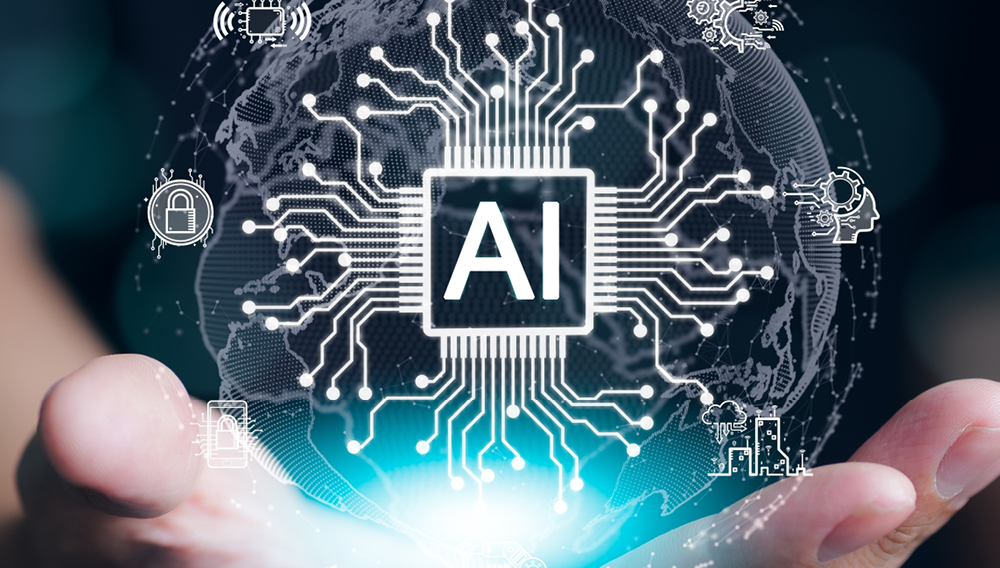How to Use AI in Marketing

Artificial intelligence (AI) is here and here to stay—but rest assured that the robots aren’t coming to steal your job just yet. And if you’re a marketer, you should definitely be excited to embrace the ways you can incorporate AI into your marketing strategies.
We’ll explore why this transformative technology is more empowering than intimidating and how you can use AI in marketing as your secret weapon to personalize experiences, predict trends, automate tasks, and more.
What Is AI?
AI is shorthand for a category of technology that mimics the way humans think to execute tasks that have traditionally required a human to perform them. These tools can range from free web applications, like ChatGPT, to custom solutions built to handle specific tasks.
AI is a broad field that includes psychology, computer science, linguistics, programming, and engineering, among others. Although it may feel like AI has very quickly exploded into the zeitgeist, you’ve probably been interacting with some forms of AI for longer than you realize.
Siri, the virtual assistant on Apple iPhones, is AI; so are in-home devices like the Google Nest and the Amazon Echo. Social media uses AI principles to serve you content, and online retailers use AI to show you promotions for items you’re likely to buy. It’s only recently that the general internet-using public has had access to artificial intelligence that’s powerful enough to generate new content like articles or images based on a user’s query—that is, generative AI—and many industries have begun to champion their use to streamline work. Particularly within the field of marketing, AI has an abundance of useful applications.
Types of AI That Are Useful in Marketing
Think about the types of tasks you do in a day. Now, think about the tasks you don’t like: the repetitive, tedious work you wish were faster and easier. There might be an AI for that, with a variety of artificial intelligence tools to choose from, depending on your needs. Whether you need to crunch numbers or create content, here are four types of AI that are useful in marketing.
- Machine learning: This type of AI continually analyzes enormous amounts of data and then, depending on what you’re trying to measure, “learns” to identify patterns. Marketers use it to predict customer behavior, forecast future sales, make decisions about market segmentation, and tailor user experiences.
- Natural language processing (NLP): Virtual assistants are examples of natural language processing AI that is useful in marketing to interact with customers in real time. NLP AI can also analyze social media posts and online reviews mentioning your company or product to give you an ongoing gauge of customer satisfaction.
- Generative AI: This type of AI can be commonly found in free online applications like DALL-E, ChatGPT, and Gemini. Using interactive prompts, generative tools develop new content and can help with creating copy as well as graphics.
- Reactive AI: Because reactive AI is programmed to deliver consistent outputs on a predefined set of inputs, it’s typically used in marketing to automate repetitive tasks. Some simple chatbots can be considered reactive AI, as can automated email responses or auto-generated product recommendations.
7 Ways to Use AI in Marketing
Applying the four main functionalities of artificial intelligence can yield a myriad of specific uses, but these seven ways to use AI in marketing can help make common tasks just a little easier—and much faster.
1. Analytics
AI is particularly suited for analytics and can be used to chart the success of your marketing efforts using any KPI you choose. AI is also useful for generating effective reports and infographics of your results to present to others.
2. Engagement Strategy
Get the right message to the right audience at the right time by using AI to predict what behavior certain populations are likely to engage in. AI can help you pinpoint the most effective ways to market to your audience and then track your results.
3. Copywriting
If you’re short on time or inspiration, AI can help by generating ad copy, tagline ideas, sample scripts, and more—nearly instantly. AI’s quick adaptability to your input makes it easy to try out different tones and textures in your writing.
4. Image Generation
One of the most talked-about features of AI is its ability to create new images on demand. This can be especially useful for small marketing teams who may not have the budget for custom imagery.
5. Audience Segmentation
AI can efficiently turn heroic amounts of customer data into actionable recommendations by picking up on behaviors and demographic patterns. This makes AI an excellent resource for identifying marketing personas for your ideal audience.
6. Media Buying
Tying into analytics and personalization, AI can assist in making decisions about where your media budget can have the most impact. AI can also be used to automatically bid on and buy keyword advertising.
7. Personalization
If you’ve used AI to create audience segments, the next step is making sure those audiences have a user experience that’s tailored to them. AI can help you create and then automatically serve up personalized landing pages, ads, and content designed for your customers’ specific needs.
How to Learn More About Artificial Intelligence in Marketing
If you want to learn more about AI in marketing, you have multiple options.
Experience
The quickest way to build AI skills is to start using it. Figuring out the capabilities and limitations of AI will help you decide what makes sense for your marketing needs. One of the loudest criticisms of generative AI is its perceived overuse. You’ll need to find the right balance of efficiency and humanity when deciding how much to rely on these kinds of tools for your content.
Certifications
Pursuing an AI certificate not only helps you develop a deeper understanding of AI’s capabilities but is a smart way to add value in your current position and strengthen your resume for the future. Marketing professionals can find online AI business education programs focused on the ethics, opportunities, and applications of AI to their field, like Wharton Online’s program AI for Decision Making: Business Strategies and Applications or the MIT Sloan School of Management’s Artificial Intelligence: Implications for Business Strategy. There are plenty of no-cost AI certifications as well, such as the AI courses offered by LinkedIn Learning and Microsoft Learn’s AI learning hub.
Degree Programs
Once exclusively the domain of technical IT and engineering programs, artificial Intelligence is increasingly being incorporated into the curricula of business schools, as educational institutions are now understanding that a familiarity with AI tools will be crucial for business professionals’ future success.
In addition to acquiring strategies for using AI, a business degree will also help you think critically about the ethical and security issues inherent in this new technology. Marketing-focused business degree programs are an excellent choice for developing a strong background in data-driven decision-making—an important skill for understanding and leveraging the data that AI generates. And classroom projects are a useful opportunity to take AI tools for a test drive, letting you experience for yourself their potential benefits and pitfalls in a more controlled environment.
Using AI in marketing can reveal a world of possibilities, and for some neophytes to the technology, it can be tempting to see AI as a quick solution for every challenge. However, there will always be a need for the nuanced critical thinking and creativity that real human experience can deliver. AI only “sees” what we show it and only does what we ask. Although AI may seem like magic, it’s a complicated system of algorithms and programming created by humans. You are in control, so don’t be afraid to experiment and explore, because the future will most certainly belong to those who use AI to work smarter.
.


